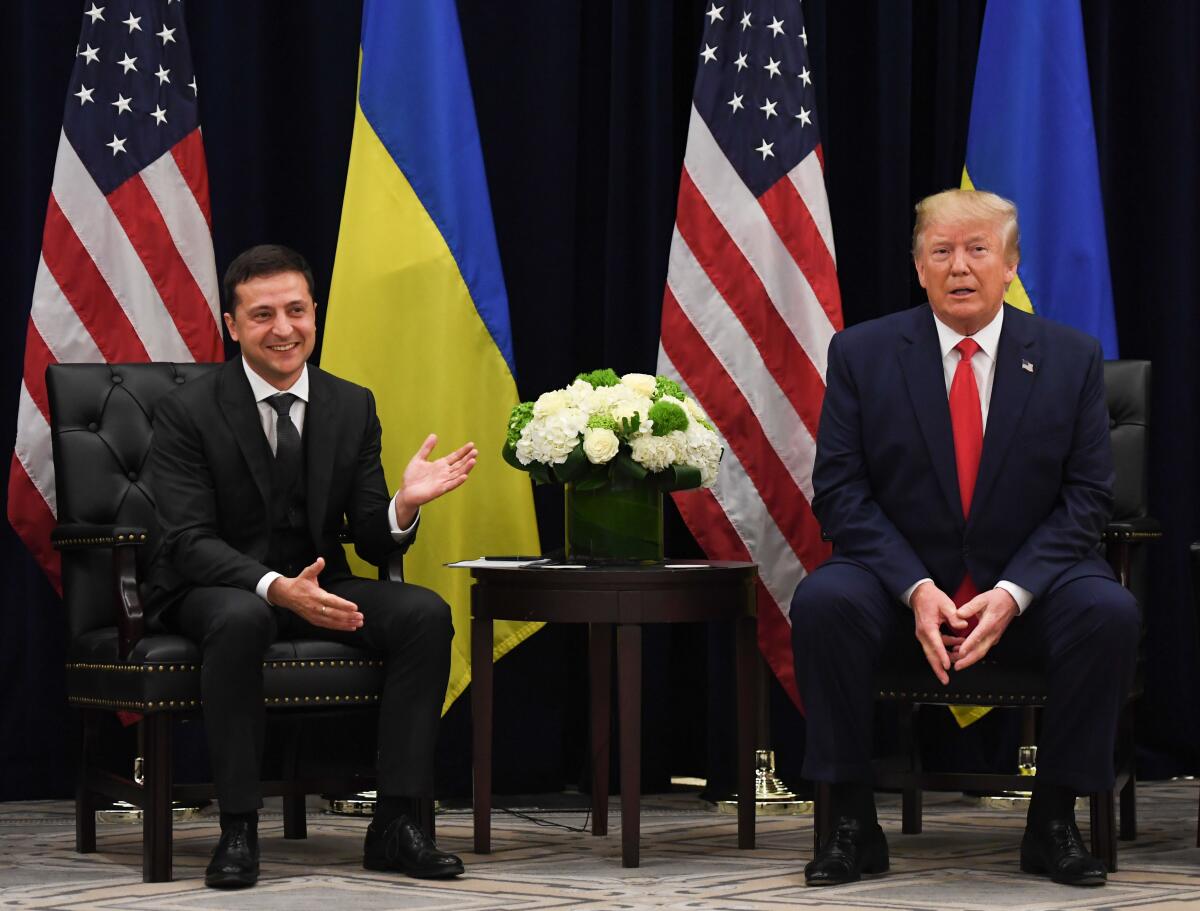How often has Trump changed his story on Ukraine? Let us count the ways

- Share via
WASHINGTON — The tangled saga of President Trump’s effort to muscle Ukraine to investigate Joe Biden and others in return for U.S. aid or a state visit to Washington hasn’t been easy to follow.
Fragments initially dribbled out of closed-door hearings as White House and State Department officials described how the president and his henchmen — is there any other word for Rudy Giuliani? — sought to twist U.S. foreign policy, apparently to boost Trump’s reelection bid.
Making sense of the complicated story will be the challenge when the House Intelligence Committee holds the first public hearings, starting Wednesday.
But Republican arguments in Trump’s defense are hard to follow too — because the president and his allies in Congress keep changing their stories.
Trump’s first response, after a whistleblower in the National Security Council raised the alarm that the president had held up military aid to Ukraine while demanding Kyiv investigate his political rivals, was simple: It never happened.
“I didn’t delay anything,” Trump told reporters.
Even he could see that whopper wouldn’t hold. Too many bureaucrats knew the White House had stopped the aid that a bipartisan majority in Congress had approved for a struggling democracy facing Russian aggression.
So Trump modified his excuse. “Why would you give money to a country that you think is corrupt?” Besides, other governments weren’t giving enough. “I’d withhold again, and I’ll continue to withhold until such time as Europe and other nations contribute,” he said.
That wasn’t convincing either. So the president tried again: He blocked the aid but never demanded anything in return for releasing it.
“No quid pro quo!” Trump insisted.
A parade of current and former officials told Congress that wasn’t true, either.
William B. Taylor Jr., the chief U.S. diplomat in Ukraine, testified that the White House was holding up the aid until Ukraine’s president would publicly promise to investigate former Vice President Joe Biden and his son Hunter Biden.
Gordon Sondland, the Trump donor-turned-ambassador who initially denied any quid pro quo, then amended his testimony. Aid “would likely not” resume until Ukraine launched the investigations Trump wanted, he admitted.
That meant the president’s defenders needed a new explanation: Yes, there was a quid pro quo, but it was part of a legitimate effort to get Ukraine to act against corruption in general.
“We do that all the time,” Trump’s acting chief of staff, Mick Mulvaney, told reporters.
Except they don’t. The Trump administration hasn’t blocked aid to any other country over corruption. And Trump never mentioned corruption when he asked Ukraine’s president, Volodymyr Zelensky, for a “favor” in their now-famous July 25 phone call.
Out came a new defense: The Ukrainians didn’t know why their aid was blocked, so it couldn’t have been a quid quo pro.
But Taylor and other diplomats testified, under oath, that Sondland clearly spelled out Trump’s demands for investigations to the Ukrainians: first in July, when they sought a Zelensky invitation to the White House, and then in September, when they asked how to get U.S. aid flowing again. Taylor and other witnesses described the quid pro quo as explicit.
Next argument: the fall-guy defense. Nobody’s proven that Trump was directly involved; all these meetings were conducted by Giuliani, Mulvaney and Sondland.
Sure. Trump’s lawyer, his chief of staff and his bumbling ambassador to the European Union cooked up this plot by themselves and never mentioned it to their boss.
Giuliani had spoken publicly for months about pushing Ukraine to investigate the Bidens — to get “information [that] will be very, very helpful to my client” — and said he kept Trump informed.
Sen. Lindsey Graham (R-S.C.) offered another defense — No. 6, by my count — saying Trump and his aides are too inept to pull off a scheme like this. (This novel argument was also used, with some success, to explain why the 2016 Trump campaign couldn’t have been guilty of collusion with Russia.)
“What can I tell you about the Trump policy toward Ukraine? It was incoherent,” Graham said. “They seem to be incapable of forming a quid pro quo.”
Incompetence, alas, is not a valid defense in criminal trials. It’s unlikely to stave off impeachment either.
Down to the last-ditch defenses. None of this matters, Trump advisor Kellyanne Conway argued, because Ukraine got its military aid in the end. Even if Trump was seeking a quid pro quo, he didn’t succeed — so what’s the problem?
“It’s not impeachable,” she declared.
And that brings us to the most important question: does Trump’s conduct — misusing American foreign policy for personal gain — merit impeachment and removal from office?
His defenders say no. “Show me something that is a crime,” Graham said.
That’s a different standard than the one Graham proposed in 1999, when he was one of the prosecutors in the impeachment of President Clinton. Then-Rep. Graham said the question was broader: whether Congress “determines that your conduct as a public official is clearly out of bounds.”
More recently, another member of Congress said the standard should be “whether the person serving as president of the United States put their own interests, their personal interests, ahead of public service.” That was Mike Pence, now Trump’s vice president.
If the Democratic-led House impeaches Trump and he goes on trial in the Republican-led Senate, much of the debate will focus on that question: Did the president’s misconduct reach a level that requires his removal from office?
As any parent of any 6-year-old can tell you, a much simpler test is available: If Trump did nothing wrong, why can’t he get his story straight?
More to Read
Get the L.A. Times Politics newsletter
Deeply reported insights into legislation, politics and policy from Sacramento, Washington and beyond. In your inbox twice per week.
You may occasionally receive promotional content from the Los Angeles Times.











